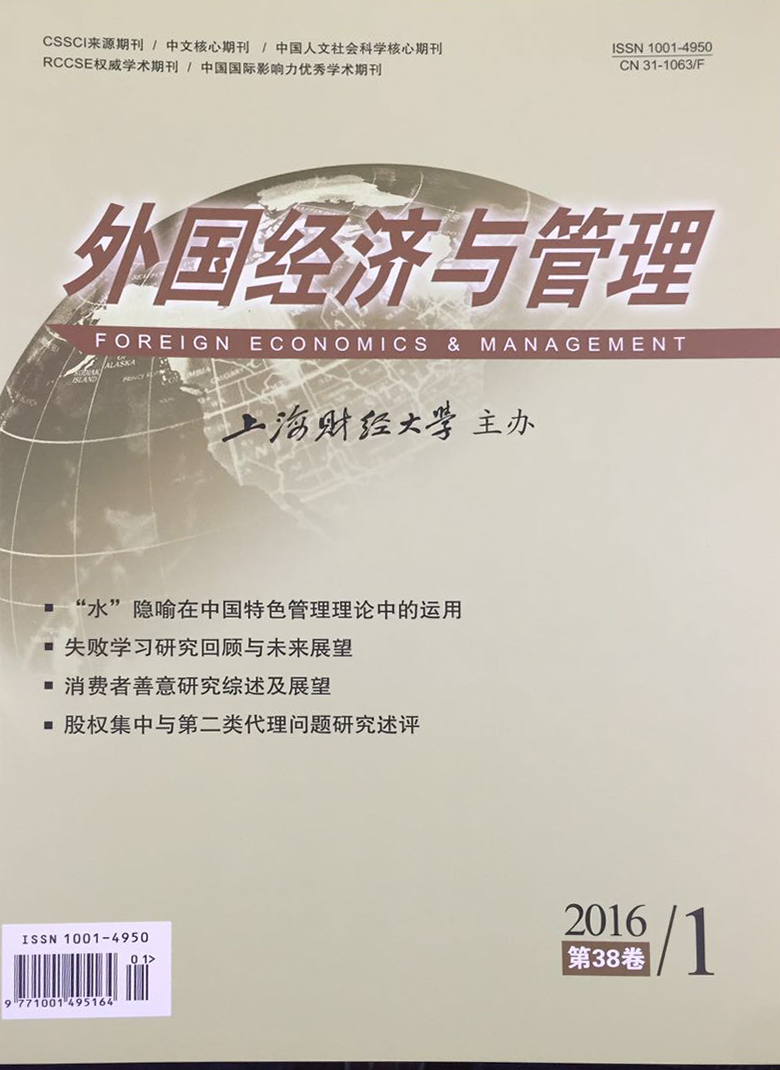消费者善意是指消费者基于个人经历或者主观认知而产生的对特定国家的喜爱之情。在当前市场全球化程度不断提高的背景下,消费者的这种对特定国家的善意会对其心理认知及消费决策产生重要影响,因而受到越来越多研究者的关注。本文主要围绕消费者善意的概念界定、引致因素、维度及测量、影响结果等方面,对相关研究成果进行了综述,并将其与相对概念——"消费者敌意"及相关概念——"来源国效应"和"消费者民族中心主义"进行了比较分析,最后对未来研究方向进行了展望。
消费者善意研究综述及展望
摘要
参考文献
1 Bandyopadhyay S, Wongtada N and Rice G. Measuring the impact of inter-attitudinal conflict on consumer evaluations of foreign products. Journal of Consumer Marketing, 2011, 28(3): 211–224
2 Batra R and Holbrook M B. Developing a typology of affective responses to advertising. Psychology & Marketing, 1990, 7(1): 11–25
3 Bernard Y and Zarrouk-Karoui S. Reinforcing willingness to buy and to pay due to consumer affinity towards a foreign country. International Management Review, 2014, 10(2): 57–67
4 Bilkey W J and Nes E. Country-of-origin effects on product evaluations. Journal of International Business Studies, 1982, 13(1): 89–100
5 Botschen G and Hemetsberger A. Diagnosing means-end structures to determine the degree of potential marketing program standardization. Journal of Business Research, 1998, 42(2): 151–159
6 Cleveland M and Laroche M. Acculturation to the global consumer culture:Scale development and research paradigm. Journal of Business Research, 2007, 60(3): 249–259
7 Ettenson R and Klein J G. The fallout from French nuclear testing in the South Pacific:A longitudinal study of consumer boycotts. International Marketing Review, 2005, 22(2): 199–224
8 Funk C A, Arthurs J D, Treviño L J, et al. Consumer animosity in the global value chain:The effect of international production shifts on willingness to purchase hybrid products. Journal of International Business Studies, 2010, 41(4): 639–651
9 Harmeling C M, Magnusson P and Singh N. Beyond anger:A deeper look at consumer animosity. Journal of International Business Studies, 2015, 46(6): 676–693
10 Holbrook M B and Hirschman E C. The experiential aspects of consumption:Consumer fantasies,feelings,and fun. Journal of Consumer Research, 1982, 9(2): 132–140
11 JaffeE D and Nebenzahl I DNational image & competitive advantage:The theory and practice of place branding
12 Klein J G, Ettenson R and Morris M D. The animosity model of foreign product purchase:An empirical test in the People's Republic of China. Journal of Marketing, 1998, 62(1): 89–100
13 Klein J G and Ettenson R. Consumer animosity and consumer ethnocentrism:An analysis of unique antecedents. Journal of International Consumer Marketing, 1999, 11(4): 5–24
14 Klein J G. Us versus them,or us versus everyone?Delineating consumer aversion to foreign goods. Journal of International Business Studies, 2002, 33(2): 345–363
15 Knight J G, Holdsworth D K and Mather D W. Country-of-origin and choice of food imports:An in-depth study of European distribution channel gatekeepers. Journal of International Business Studies, 2007, 38(1): 107–125
16 Kupka B, Everett A M and Cathro V. Home alone and often unprepared-intercultural communication training for expatriated partners in German MNCs. The International Journal of Human Resource Management, 2008, 19(10): 1765–1791
17 Leong S M, Cote J A, Ang S H, et al. Understanding consumer animosity in an international crisis:Nature,antecedents,and consequences. Journal of International Business Studies, 2008, 39(6): 996–1009
18 Macchiette B and Roy A. Affinity marketing:What is it and how does it work?. Journal of Services Marketing, 1992, 6(3): 47–57
19 Nes E B, Yelkur R and Silkoset R. Exploring the animosity domain and the role of affect in a cross-national context. International Business Review, 2012, 21(5): 751–765
20 Nes E B, Yelkur R and Silkoset R. Consumer affinity for foreign countries:Construct development,buying behavior consequences and animosity contrasts. International Business Review, 2014, 23(4): 774–784
21 Nijssen E J and Douglas S P. Examining the animosity model in a country with a high level of foreign trade. International Journal of Research in Marketing, 2004, 21(1): 23–38
22 Oberecker E M, Riefler P and Diamantopoulos A. The consumer affinity construct:Conceptualization,qualitative investigation,and research agenda. Journal of International Marketing, 2008, 16(3): 23–56
23 Oberecker E M and Diamantopoulos A. Consumers' emotional bonds with foreign countries:Does consumer affinity affect behavioral intentions?. Journal of International Marketing, 2011, 19(2): 45–72
24 Rice G and Wongtada N. Conceptualizing inter-attitudinal conflict in consumer response to foreign brands. Journal of International Consumer Marketing, 2007, 20(1): 51–65
25 Riefler P and Diamantopoulos A. Consumer animosity:A literature review and a reconsideration of its measurement. International Marketing Review, 2007, 24(1): 87–119
26 Riefler P and Diamantopoulos A. Consumer cosmopolitanism:Review and replication of the CYMYC scale. Journal of Business Research, 2009, 62(4): 407–419
27 Riefler P, Diamantopoulos A and Siguaw J A. Cosmopolitan consumers as a target group for segmentation. Journal of International Business Studies, 2012, 43(3): 285–305
28 Roth M S and Romeo J B. Matching product category and country image perceptions:A framework for managing country-of-origin effects. Journal of International Business Studies, 1992, 23(3): 477–497
29 Saran A and Kalliny M. Cosmopolitanism:Concept and measurement. Journal of Global Marketing, 2012, 25(5): 282–291
30 Sharma S, Shimp T A and Shin J. Consumer ethnocentrism:A test of antecedents and moderators. Journal of the Academy of Marketing Science, 1995, 23(1): 26–37
31 Shimp T A and Sharma S. Consumer ethnocentrism:construction and validation of the CETSCALE. Journal of Marketing Research, 1987, 24(3): 280–289
32 Steenkamp J B E M, Hofstede F T and Wedel M. A cross-national investigation into the individual and national cultural antecedents of consumer innovativeness. Journal of Marketing, 1999, 63(2): 55–69
33 Swift J S. Cultural closeness as a facet of cultural affinity:A contribution to the theory of psychic distance. International Marketing Review, 1999, 16(3): 182–201
34 Verlegh P W J and Steenkamp J B E M. A review and meta-analysis of country-of-origin research. Journal of Economic Psychology, 1999, 20(5): 521–546
35 Wongtada N, Rice G and Bandyopadhyay S K. Developing and validating affinity:A new scale to measure consumer affinity toward foreign countries. Journal of International Consumer Marketing, 2012, 24(3): 147–167
36 范 孝雯, 史 冰, 王 海忠, 何 浏, 柳 武妹. 消费者敌意对青少年国产品牌购买意愿的影响机制. 营销科学学报, 2013, 9(3): 96–105
37 郭 功星, 周 星, 涂 红伟. 消费者敌意研究脉络梳理及未来展望. 外国经济与管理, 2014, 36(6): 51–59
引用本文
郭功星, 周星. 消费者善意研究综述及展望[J]. 外国经济与管理, 2016, 38(1): 76–86.
导出参考文献,格式为:
上一篇:职业生涯持续学习研究述评与展望
下一篇:股权集中与第二类代理问题研究述评





 6836
6836  6744
6744

